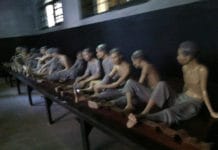Support Rashid during his own medical crisis – see below
by Kevin ‘Rashid’ Johnson
It’s the evening of April 11, 2014. Another prisoner down the tier, Jaicourrie (Romero) Finley, No. 1354674, is taken out of the unit on a gurney by several guards and a nurse. Finley was suffering one of several recent grand mal seizures that have seen him go back and forth from the local emergency room for more than a week now. He’d just had two bad seizures the day before.

This sudden onset of attacks resulted from a prison nurse, Linda Simmons, terminating Finley’s epileptic medication upon her claims that he’d not been taking it. Not only were her claims a lie, they were retaliation. Her reason: Finley was a vocal witness to her involvement in the Nov. 13, 2013, death of another prisoner, Joseph Comeaux.
Finley’s fight for justice
Comeaux, along with Finley and several other prisoners, anticipated that Texas Department of Criminal Justice (TDCJ) officials would ultimately kill him, so Finley promised Comeaux that in the event that he died suspiciously, Finley would inform his wife and the courts of the circumstances surrounding his death. Now, Finley is being targeted for honoring his word to his deceased neighbor.
Finley wrote to Comeaux’s widow and several courts in which Comeaux – a victim of longstanding abuses by TDCJ officials – had pending litigation, informing them that officials at this Clements Unit prison had killed Comeaux.
Not only that, but he’d written a complaint to the Texas Board of Nursing seeking an investigation of Simmons for her role in Comeaux’s death. The board had written Finley back, informing him that only Comeaux’s next of kin could properly file such a complaint, so he referred the matter to Comeaux’s widow.
Finley promised Comeaux that in the event that he died suspiciously, Finley would inform his wife and the courts of the circumstances surrounding his death. Now, Finley is being targeted for honoring his word to his deceased neighbor.
Right after Finley had written the courts, investigators from the TDCJ Inspector General’s Office confronted him about the letters, demanding to know why he was saying Clements Unit staff had killed Comeaux. He felt it was a move to intimidate him and cover up what had occurred.
During the week of March 16, 2014, Nurse Simmons confronted Finley about his letter to the Board of Nursing, screaming at him: “I don’t know why you’re trying to help Comeaux. I didn’t kill him. He killed himself by being a sex offender.”
When Finley didn’t reply, Simmons repeatedly yelled: “Answer me, dammit! Answer me!” Finley just turned and walked away, leaving her standing at his cell door fuming. Simmons then had his seizure medications terminated with the result stated above.
Murder by medical neglect
Finley briefly explained that Simmons and prison guard Sgt. Andrew Gratz – who was involved in the killing of another prisoner, Christopher Woolverton, on Oct. 23, 2013 – had left Comeaux lying on his cell floor for several hours suffering breathing complications. Comeaux was a known asthmatic. When Comeaux was finally brought out of the cell, he died shortly thereafter in the prison’s medical department.

The entire event – from the extended period he was left on the floor complaining of inability to breathe to his death in the medical department – was audio-video recorded. However, according to various guards, it was falsely reported that he’d died en route to the hospital from a heart attack.
Yet by all witness accounts – both guards and prisoners – Comeaux never complained of any cardio-related symptoms, only of the inability to breathe. Simmons came to the cell several times only to tell Comeaux, “Calm down, inmate,” yet did nothing to help him. Finley was housed in the cell next door to Comeaux.
Why Comeaux?
Comeaux had been threatened with death by TDCJ officials on numerous occasions and had been subjected to their abuses for a long while. His name was well known throughout the TDCJ. In fact, I’d heard a great deal about him before I was ever assigned to the Clements Unit in 2013, where he was also confined.
Comeaux was known and officially hated in part because of his legal battles against abusive TDCJ conditions. But the major reason was his widely acclaimed alleged escape from TDCJ custody, where it is said he used a gun given to him by guards.
Several things about Comeaux added insult to injury for TDCJ. He was handicapped, unable to walk unassisted; he was New Afrikan/Black – a slap in the face to the racist elements in TDCJ; and he never bowed to abuses and threats from officials calculated to force him to reveal how he’d gotten the gun.
Comeaux was abused by everyone from wardens down to line level guards and medical staff, with many witnesses to his mistreatment, including his widow, who also shared in being harassed by TDCJ staff. Comeaux was denied visits with his family, his personal and legal property were routinely confiscated, he was subjected to frequent cell and strip-body cavity searches, he was sexually assaulted by guards, and guards pointed guns at and threatened to kill him while outside the prison on court runs.
Comeaux was known and officially hated in part because of his legal battles against abusive TDCJ conditions. But the major reason was his widely acclaimed alleged escape from TDCJ custody, where it is said he used a gun given to him by guards.
Medical staff routinely cut his prescriptions for asthma medications short. For example, the unit doctor would prescribe Comeaux’s asthma inhaler replaced in 30 days, but nurses would force him to use the same inhaler for 90 days. The inhaler would run out, causing him respiratory problems and asthma attacks, which is likely what precipitated his death.
Although he was handicapped, Comeaux was housed in an upstairs cell and made to walk up and down the stairs with guards’ “assistance.” He was dropped down the stairs by guards, was never given a wheelchair or taken downstairs by the elevator that was just down the hall from his cell. Finley and many other prisoners were witnesses to these abuses.
A damning video
Several guards who reported viewing the video of Comeaux’s denied care and death have stated “a lot of heads will roll” if that video is seen outside the TDCJ because “they let Comeaux die.” The unit doctor who was present when Comeaux died conspicuously made no effort to revive him, but only put a stethoscope to his chest and pronounced him dead just moments after Comeaux stated to them that he was dying.
Also on video, Sgt., now Lt., Gratz was repeatedly summoned to come to Comeaux’s cell as he lay in distress on the day he died. Gratz refused to come. Ultimately, Sgt. Joshua Branscum was summoned and had Comeaux taken to the medical department, where he promptly died.
Several guards who reported viewing the video of Comeaux’s denied care and death have stated “a lot of heads will roll” if that video is seen outside the TDCJ because “they let Comeaux die.” The unit doctor who was present when Comeaux died conspicuously made no effort to revive him.
Comeaux’s neglect and death was recorded on portable camera by young Black guard Tyrail Crosby, who suspiciously no longer works for the TDCJ.
I’d specifically heard Crosby on several occasions tell other guards and prisoners that he was disturbed by what happened to Comeaux. Veteran TDCJ guard David Dwight told Crosby that he should “get used to seeing the bottoms of their feet,” because prisoners dying at Clements Unit is a “regular thing.”
Comeaux’s neglect and death was recorded on portable camera by young Black guard Tyrail Crosby, who suspiciously no longer works for the TDCJ.
Various prisoners who’ve been confined at this unit for several years also have told me much the same. All whom I’ve talked to about this have witnessed others die after seeking yet being denied medical help in situations where emergency care was obviously warranted.
Veteran TDCJ guard David Dwight told Crosby that he should “get used to seeing the bottoms of their feet,” because prisoners dying at Clements Unit is a “regular thing.”
Indeed, another widely recognized TDCJ prisoner, David Ruiz, was also the victim of murder by medical neglect. Ruiz was responsible for the historic lawsuit brought in the 1970s that led to sweeping charges of openly barbaric conditions in the TDCJ. He was left to suffer from undisclosed – although known to TDCJ officials – and untreated cancer, chronic hepatitis and gall stones, from which he ultimately died in 2005.
Finley’s fight for his life
Now Finley’s family and parole lawyer fear for his safety. They worry that further retaliations will take the form of negative matter being put in his record, which will cause him to remain in administrative segregation and be denied parole. As of May 7, 2014, Finley is still not receiving his seizure medications.
As of May 7, 2014, Finley is still not receiving his seizure medications.
The advice from Finley’s loved ones and legal defense is to cave in to official terrorism and forsake Comeaux’s cause. I counseled him to stand firm and to expose what’s being done to him, and in support of this advice I’ve written this article.
Dare to struggle. Dare to win!
All Power to the People!
Send our brother some love and light: Kevin “Rashid” Johnson, 1859887, Clements Unit, 9601 Spur 591, Amarillo TX 79107.
Rashid experiencing a frightening medical crisis
by Noelle Hanrahan, P.I., Prison Radio
May 29, 2014 – We just got word that Kevin “Rashid” Johnson, creator of outstanding articles and art work featured on Prison Radio – he designed the logo of the California hunger strikes – began having a medical crisis on May 14. He had crippling pain behind his left eye, blurred vision and very high blood pressure. This case of severe hypertension if untreated could cause life threatening medical episodes.

Today Rashid told us: “Medical neglect is a serious problem here. I personally have witnessed two inmates die from neglect. On the night of May 14, Nurses Doak and Armstrong referred me to see a doctor on May 15. I have never seen a doctor.”
During this health emergency, Rashid was denied a scheduled legal visit. On May 19, mitigation specialist Cynthia Skow and I were scheduled to fly to Texas, but our visit was prevented by the Clements Unit and the ignominiously named Texas Office of Access to Counsel. Rashid’s legal team will reschedule this trip ASAP and is fighting this illegal and inappropriate action by the TDCJ.
The state of Virginia (Rashid is being held in Texas on an intrastate compact transfer) has tried tactic after tactic to isolate and prevent Rashid from communicating. They transferred Rashid out of state in 2012. He has had only two phone calls while in Texas for the past year and only four visits in the two years since his transfer from Virginia. In Texas he can only purchase 40 stamps per month; if he is broke, he gets 10 stamps as an indigent prisoner.
Now is the time to turn the white hot spotlight on punishment in the solitary confinement Clements Unit at the TDCJ. We are standing with Rashid.
- Please call and tell the warden at the TDCJ Clements unit that health care is a human right. Demand that Rashid see a doctor. TDCJ Clements, 9601 Spur 591, Amarillo, TX 79107-9606, 806-381-7080.
- Call and write a personal note to the Ombudsman, P.O. Box 99, Huntsville, TX 77342-0099. Call the TDCJ Health Services Division Office of Professional Standards, at 936-437-4271, fax 936-437-4930 or email ombudsman@tdcj.state.tx.us.
- Call and write the Inspector General’s Office, at 512-671-2490 or write 11101 Metric Blvd., Building I, Austin, Texas 78758.
- Write Rashid today: Kevin “Rashid” Johnson, 1859887, Clements Unit, 9601 Spur 591, Amarillo TX 79107. Send your Rashid postcards. If you don’t have a stack of them for you and your friends to write to Rashid, order them from us. Let him know that he is not alone!
- Put money on Rashid’s inmate trust account.
Noelle Hanrahan, P.I., founded and directs Prison Radio to challenge unjust police and prosecutorial practices which result in mass incarceration, racism and gender discrimination. Its independent multi-media production studio produces the recorded essays by Mumia Abu Jamal and other prisoners that are broadcast on radio stations around the world. Noelle can be reached at globalaudiopi@gmail.com.

 Store
Store











